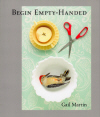Begin Empty-Handed
While the title of Gail Martin’s second collection of poetry, Begin Empty-Handed, calls to mind a state of lack, it also implies a readiness to be filled, an openness to whatever might come to hand. This tension between remaining unburdened and delightfully accepting whatever turns up runs throughout Martin’s poems, as they both critique and catalog the world through the eyes of a therapist, daughter, wife, and mother. Winner of the 2013 Perugia Press Prize, Begin Empty-Handed crackles with wit and humor even as it considers loss and questions of responsibility in poems that clip along with intensity.
While the title of Gail Martin’s second collection of poetry, Begin Empty-Handed, calls to mind a state of lack, it also implies a readiness to be filled, an openness to whatever might come to hand. This tension between remaining unburdened and delightfully accepting whatever turns up runs throughout Martin’s poems, as they both critique and catalog the world through the eyes of a therapist, daughter, wife, and mother. Winner of the 2013 Perugia Press Prize, Begin Empty-Handed crackles with wit and humor even as it considers loss and questions of responsibility in poems that clip along with intensity.
Martin works as a psychotherapist in private practice, and evidence of her professional experiences appears throughout the collection. In the poems that center on Martin’s work, the title’s sense of remaining unburdened comes through strongest. For instance, the speaker of “The Therapist Watches Birds” considers culpability in this way:
I don’t care deeply about birds. I enjoy them.
They raise questions in a casual way. I have found
them with their necks broken at the base
of my window. There are cats and fox and snakes.
Some nights are just too cold. I am not responsible.
This musing comes after stanzas which consider patients’ struggles—“The man who cut his hard cherry trees to pay / his hospital bills,” a woman who’d “been standing in the lake up to her neck / for a while to keep from hurting herself.” Like these excerpts, Martin’s poems tend toward plain speech, the rhythms of conversation turned into verse, no matter how startling their subject matter. With this even-handedness, Martin confronts us with the stark realities of what it means to professionally deal with mental illness on a daily basis.
Although Martin frequently chooses to write in a direct mode, she also peppers her poems with wonderfully specific images. The poems of Begin Empty-Handed encompass “Angus calves, / small black boxcars, their square heads / above the grass”; “white tulips in a crystal jar, // Japanese pearl divers, skirts flaring / in the light then becoming the light”; and a house like “a scarf where stitches got dropped / in the third row” (“Letters to an Invented Sister,” “Begin Empty-Handed,” and “Not a House You Can Live In, Cold,” respectively). These images hum with joy in their exactness—they speak to the poet’s attention, her ability to render the world both precisely and uniquely. Woven into poems that could feel cold in their directness, these memorable images shine through with the warmth of surprise.
Through its combination of directness and delight, Begin Empty-Handed presents a complex speaker’s vision of the world. Martin speaks with one voice—whether it’s exactly her own or not, these poems work to reveal a speaker who can describe her daughter (in “Hawaii Volcanoes National Park”) as being like
The way Gould begins to play the Goldberg
variations, then lifts his hands
from the keyboard laughing or talking
a bit to himself, interrupting what might
have flowed naturally from that point
When she also notes that “My mother told me she prayed each day she’d die before my father” (“Why the Therapist Loves Ironing”), Martin displays a willingness to include everything in her work—directness and figurative language, the professional and the personal, starkness and beauty. By casting a wide net, Begin Empty-Handed succeeds in creating what feels like a true picture of life, one that encompasses opposites and shows us how they ultimately come together into a whole.





